ANIMALPASTOR
OCTOBER 4, 2013 - FEAST OF ST FRANCIS - ASSISI - ITALY
When Pope John Paul II declared in a public audience in 1990 that 'also the animals possess a soul and men must love and feel solidarity with our smaller brethren' some people must have thought this was a new teaching, unaware of the Holy Father's scholarly familiarity with the authentic Hebrew texts.
When he went on to state that all animals are 'fruit of the creative action of the Holy Spirit and merit respect' and that they are 'as near to God as men are', animal lovers in the audience were ecstatic!
The Pope mentioned the special relationship of mankind with God as being created in His image and likeness. 'However,' he went on 'other texts state that animals have the breath of life and were given it by God.
In this respect, man, created by the hand of God, is identical with all other living creatures. And so in Psalm 104 there is no distinction between man and beasts when it reads, addressing God:
"Thou hidest thy face, they are troubled: thou takest away their breath, they die, and return to their dust. Thou sendest forth thy spirit, they are created: and thou renewest the face of the earth."
'The existence therefore,' the Holy Father reminded us, 'of all living creatures depends on the living spirit/breath of God that not only creates but also sustains and renews the face of the earth.'
This discourse caused a stir around the world, and was especially encouraging to Catholic animal welfare groups which had begun to despair that anything 'animal friendly' would ever be heard in Rome.
The then professor of theology and dogma at the University of Urbino, Carlo Molari, called it 'very important and significant. It is a "sign of the times" because it demonstrates the Church's desire and deep concern to clarify present confused thinking and attitudes towards the animal kingdom. There should be no need, but the Pontiff, in reiterating that animals came into being because of the direct action of the "breath" of God, wanted to say that also these creatures, as well as man, are possessed of the divine spark of life and that living quality that is the soul. And are therefore not inferior beings or only of a purely material reality'...
Martin Luther said: "I believe, that God created me and all other creatures!”
Unfortunately many Christians seem to have forgotten this! In many countries all over the World, with the majority of the population being of catholic belief, billions of animals are abused and tortured every day and the destruction of our planet - the creation of God - goes on irresistibly.
And the Church?
The Church remains silent. The Catholic Church, as one of the most powerful and opinion-forming religions and institutions in the world, still keeps waiting to declare animals as creatures of God and to spread this message to all its believers. The Church does not admonish its believers to responsible actions, and the necessity of Christian charity seems to be limited to humans only.
The subjects 'animals' and 'environment' are consequently neglected. Not a word about animals in „urbi et orbi“, and not a word about them during the church services.
Every life deserves protection, respect and sympathy!
The Catholic Church should be a paradigm, on which people can orientate towards in their daily actions regarding not only their human brothers and sisters, but also the animals and the environment! If the Church, the Pope, their Bishops and Priests, would call to save the animals and our nature, there would surely be improvements to the situation, and many Christians are waiting, that „their“ Church - at last - admits to the protection of animals and the environment, and acts that way!
As part of his campaign „They are our brothers and sisters!“ Tom, the Animalpastor, will be in Assisi (Italy), on 4th of October, 2013 - the day of St Francis of Assisi.
He will be there on behalf of all the tortured and prosecuted animals. He will bless animals and he will leave a personal letter for Pope Francis I, pointing out the importance and responsibility of the Church towards animals, together with a list of signatures and personal messages to Pope Francis I, written by people from all around the world. You can sign the said petition and leave your message to Pope Francis I directly on this website, under the tab 'petition'. Tom will take both the signatures list, and your messages to the Pope, to Assisi in October 2013.
The pictures that you can see below, were taken during Tom's first visit in Rome in October 2011, as part of his campaign "Quo Vadis, Vatican?"





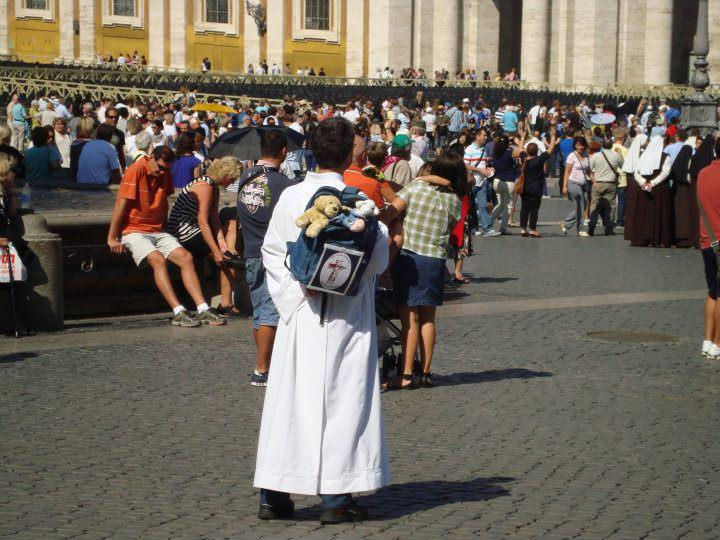

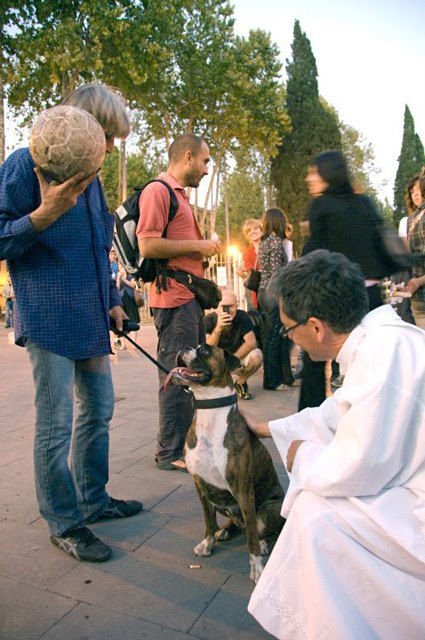
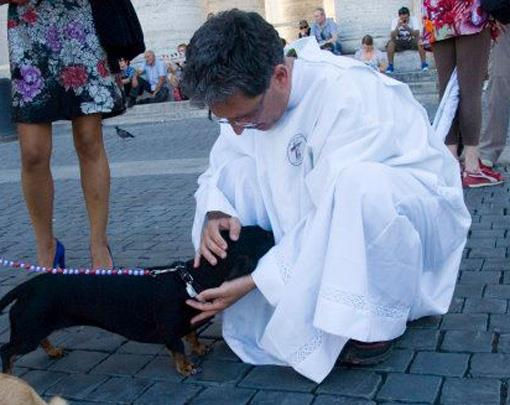

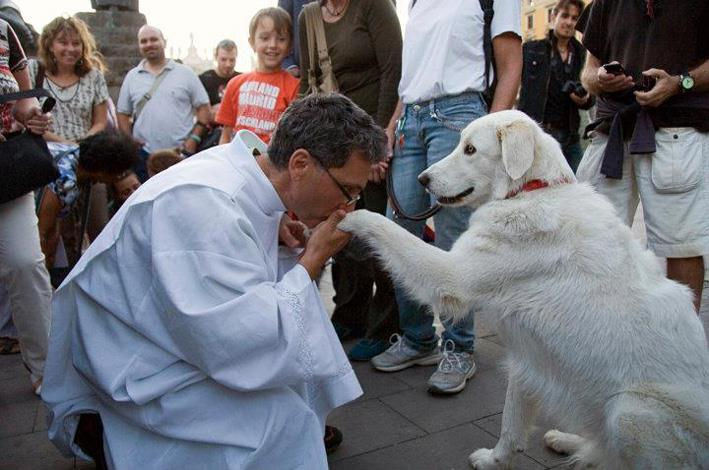







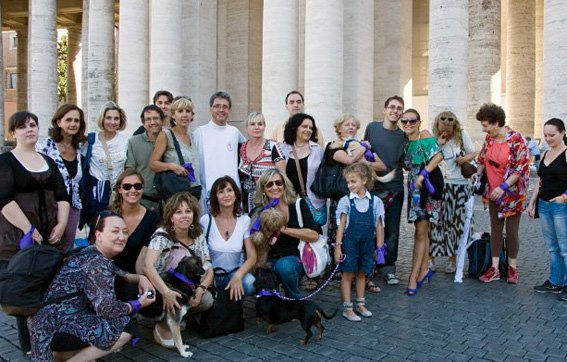



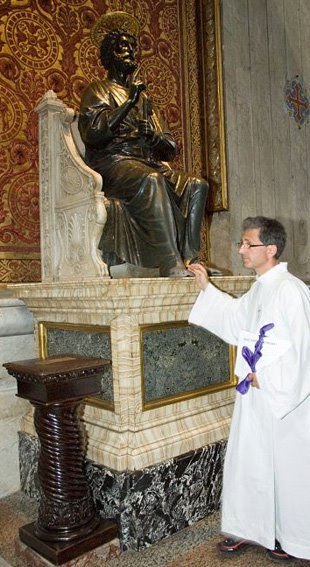

October 4, 2013 - the Feast of St Francis of Assisi
God's Creation
Many of the stories that surround the life of St Francis deal with his love for animals. Perhaps the most famous incident that illustrates the Saint's humility towards nature is recounted in the "Fioretti" ("Little Flowers"), a collection of legends and folklore that sprang up after the Saint's death. It is said that, one day, while Francis was travelling with some companions, they happened upon a place in the road where birds filled the trees on either side. Francis told his companions to "wait for me while I go to preach to my sisters the birds." The birds surrounded him, intrigued by the power of his voice, and not one of them flew away. He is often portrayed with a bird, typically in his hand.
Another legend from the Fioretti tells that in the city of Gubbio, where Francis lived for some time, was a wolf "terrifying and ferocious, who devoured men as well as animals." Francis had compassion upon the townsfolk, and so he went up into the hills to find the wolf. Soon, fear of the animal had caused all his companions to flee, though the saint pressed on. When he found the wolf, he made the sign of the cross and commanded the wolf to come to him and hurt no one. Miraculously the wolf closed his jaws and lay down at the feet of St Francis. "Brother Wolf, you do much harm in these parts and you have done great evil," said Francis. "All these people accuse you and curse you... But brother wolf, I would like to make peace between you and the people." Then Francis led the wolf into the town, and surrounded by startled citizens made a pact between them and the wolf. Because the wolf had “done evil out of hunger, the townsfolk were to feed the wolf regularly. In return, the wolf would no longer prey upon them or their flocks. In this manner Gubbio was freed from the menace of the predator. Francis even made a pact on behalf of the town dogs, that they would not bother the wolf again. Finally, to show the townspeople that they would not be harmed, Francis blessed the wolf.
Francis preached the teaching of the Catholic Church, that the world was created good and beautiful by God but suffers a need for redemption because of the primordial sin of man. He preached to man and beast the universal ability and duty of all creatures to praise God (a common theme in the Psalms) and the duty of men to protect and enjoy nature as both the stewards of God's creation and as creatures ourselves.
On November 29, 1979, Pope John Paul II declared St Francis to be the Patron of Ecology...
It was with a call for the protection of the weakest in society that Francis was officially inaugurated March 19, 2013 as the Catholic Church's 266th pontiff. Giving his homily before the throngs in St. Peter's Square, Francis showed the humility and concern for ordinary people that have been noted since he became the first Latin American to be elected pope six days ago.
Before he spoke, he was given the official symbols of his papacy: a lamb's wool shawl, to represent his role as "the good shepherd," and the Fisherman's Ring, to represent his role of spreading the gospel. The ring is not solid gold like that of his predecessors, but made of gold-plated silver -- again reflecting his desire for simplicity.
The new pope delivered his homily in Italian, rooted in a message of looking after the poor and sick, as well as the natural world...
In honor of both St Francis of Assisi and the animals, Tom, the Animalpastor will be in Assisi (Italy), on October 4th, the day of St Francis. During his visit, Tom will leave a personal letter for Pope Francis I, pointing out the importance and responsibility of the Church towards animals, together with your signatures and your personal messages to Pope Francis I.